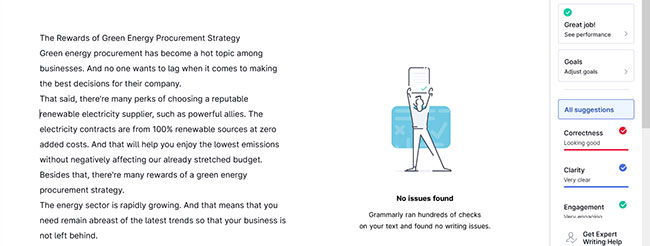The Rewards of Green Energy Procurement Strategy
Green energy procurement has become a hot topic among businesses. And no one wants to lag when it comes to making the best decisions for their company.
That said, there’re many perks of choosing a reputable renewable electricity supplier, such as powerful allies.
The electricity contracts are from 100% renewable sources at zero added costs. And that will help you enjoy the lowest emissions without negatively affecting our already stretched budget.
Besides that, there’re many rewards of a green energy procurement strategy. These include:
From an energy budgeting angle, when you reduce your business’ exposure to volatile supplier market prices, you enjoy long-term price certainty.
If your strategy is successfully executed, you will need to publicize the outcome.
Your business stakeholders, such as investors and customers will want to know the amount of green energy procured.
That means that you need to collect and verify all the details before sharing results with stakeholders. That can result in delays. But you can utilize platforms that can drastically improve this process, helping in the real-time visualization of renewable energy use.
When you have real-time access to data, some of the benefits you can enjoy include;
1. Competitive advantage and improved brand image
The more you achieve high levels of renewable energy, the better your brand recognition. People notice businesses determined to reduce their carbon footprint and always look forward to buying their products.
When this happens, it improves your sales. And this boosts your brand. Besides, since renewable electricity is reliable, it means your business will not experience downtime. If this happened, it would lead to a staggering loss in revenue.
If all your processes are seamless, you will expand your customer base, have a steady relationship with stakeholders and increase revenues.
2. Easier access to financial and credit sustainability
Businesses thought to be more sustainable could access low interests in green energy. Since transitioning to this could cost you an arm a leg, the right supplier will hold your hand every step of the way.
3. You attract resourceful employees.
If potential employees see your efforts in meeting renewable energy efforts, they get drawn to your business. That helps you attract high-quality manpower in the market.
A business with a poor sustainability image may have a lower talent pool. For this reason, you have to show an effort towards reducing your business’ carbon footprint.
4. Quick decision-making
With access to real-time granular energy data, you allow for faster analysis and decision-making concerning green procurement.
If your business experiences shortfalls during a particular year, you may take the correct action to rectify the shortfall and minimize the risk of missing renewable targets.
As with any other business strategy, it is crucial to remain open to change. And adapt to the green procurement strategy.
If your competitors choose to follow this route, that may be it for your business. They will not only improve their brand name but increase their sales and maintain a good relationship with their stakeholders.
The energy sector is rapidly growing. And that means that you need remain abreast of the latest trends so that your business is not left behind.
Creating a long-term energy procurement strategy will help you stay ahead of market changes and enjoy financial as well as non-financial benefits.
When choosing a supplier for your renewable electricity, you have to consider an industry leader. Check how many businesses they’re serving currently and what they’re saying about their services.
Besides, choose a supplier that has been in the industry for a considerable time. That means that they understand the ins and outs of green energy. And will help your business adapt to the latest changes.
Finally, check their ratings, recommendations, and accreditations. They have to be ISO certified so that you’re sure you can depend on their green energy supply.


